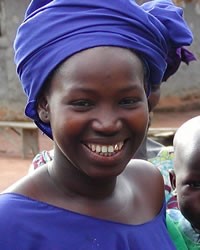Maninka, Eastern in United States

Photo Source:
Copyrighted © 2026
International Mission Board-SBC All rights reserved. Used with permission |
Send Joshua Project a map of this people group.
|
| People Name: | Maninka, Eastern |
| Country: | United States |
| 10/40 Window: | No |
| Population: | 16,000 |
| World Population: | 4,610,000 |
| Primary Language: | Maninkakan, Eastern |
| Primary Religion: | Islam |
| Christian Adherents: | 0.50 % |
| Evangelicals: | 0.05 % |
| Scripture: | New Testament |
| Ministry Resources: | Yes |
| Jesus Film: | Yes |
| Audio Recordings: | Yes |
| People Cluster: | Manding |
| Affinity Bloc: | Sub-Saharan Peoples |
| Progress Level: |
|
Introduction / History
The Eastern Maninka is a subgroup of a much larger people group known as the Mande, who inhabit the western portion of Africa's northern plains and coastal forests. We know the Maninka for their ingenuity and leadership qualities, as well as their trading, farming and mining abilities. They are the descendants of the people of the once great Mali Empire. The empire amassed a substantial fortune, taxing the trade of gold and ivory in the region. Before becoming a part of the empire, they credited the Mande with revolutionizing agriculture in the area; they discovered the use of millet. The Maninka speaks a Manding language that is also called Maninka. Manding languages are spoken in many West African nations. Although some of these languages have no written script, their oral literature is regarded as some of the best in the world.
Where Are they Located?
The Eastern Maninka are spread around in West Africa, especially Guinea. There are smaller numbers of them in Canada and the United States.
What Are Their Lives Like?
Most of North America's immigrants from Africa are from the wealthy communities. They are often scholars and businessmen. Most likely, the Eastern Maninka people in the United States socialize with other African migrants who share a similar culture. This slows down the process of acculturation, but as one generation gives way to the next, the old ways eventually weaken and die out. Their society is patriarchal, meaning that the father has much economic and social power. This is being challenged as the Maninka people who live in Western countries like Canada and the United States.
What Are Their Beliefs?
The Eastern Maninkas have adapted the doctrines of Islam to their own beliefs, resulting in a wide variety of sects. Islam was first introduced in West Africa by Muslim merchants. Their desire was to enhance the region both religiously and culturally. Since the Maninkas were not required by Islamic leaders to abandon their old customs and mystical beliefs, Islam was simply mixed with their traditional religions. Divination, healing, and the casting of spells are all important parts of their religion. In fact, Maninka Islam approves and even encourages certain magical procedures-particularly those directed towards healing the sick, preventing misfortunes, and ensuring prosperity. As the Maninka Muslims come in contact with Muslims from other parts of the world, they are likely to have their animistic beliefs challenged. Animistic practices become less relevant to people living in an urban environment like they find in North America.
What Are Their Needs?
Although evangelistic tools such as the New Testament and the JESUS Film are available to the Maninkas, the people are reluctant to accept Christ. Perhaps this resistance will become less pronounced as they become more like their North American neighbors.
Prayer Points
Ask the Lord of the harvest to send more laborers to the African Muslims in the United States. Ask the Holy Spirit to grant wisdom and favor to mission agencies focusing on the Maninka peoples. Pray that God will give Maninka believers boldness to share Christ with their own people. Ask the Lord to bring forth a triumphant Maninka church in North America for the glory of his name.